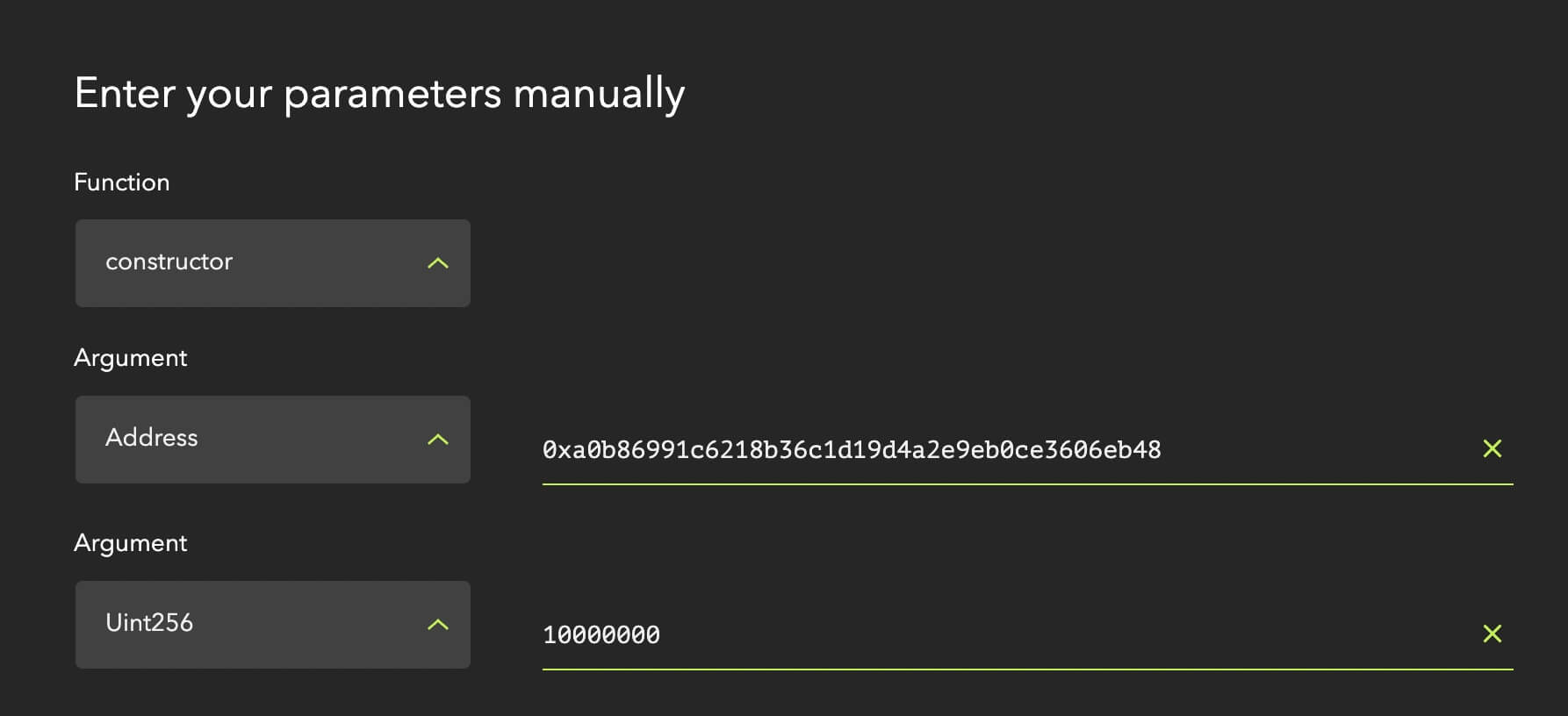This project is a fork of Scaffold-ETH 2 that demonstrates how to build, debug, test, and deploy an Open Action Module on Lens Protocol using Hardhat.
Features:
- ✅ Run a local EVM chain and test contracts locally with Hardhat
- ✅ Deploy a mock ModuleRegistry contract
- ✅ Deploy an ERC20 token contract used for whitelisted tips
- ✅ Deploy an Open Action Module contract
- ✅ Deploy a Collect Action Module contract
- ✅ Debug local contract calls with a graphical interface
- ✅ Verify contracts on Etherscan
- Requirements
- Quickstart
- Debugging
- Unit Testing
- Deploying to Testnet
- Using your own contracts
- About Scaffold-ETH 2
Before you begin, you need to install the following tools:
- Node (>= v18.17)
- Yarn (v1 or v2+)
- Git
To get started with Scaffold-Lens, follow the steps below:
-
Install
Clone this repo & install dependenciesgit clone https://github.com/iPaulPro/scaffold-lens cd scaffold-lens yarn install -
Start a chain
Run a local network in a terminal from the root directory:yarn chain
This command starts a local Ethereum network using Hardhat. The network runs on your local machine and can be used for testing and development. You can customize the network configuration in
hardhat.config.ts. -
Start the app
On a second terminal, from the root directory, start your NextJS app:yarn start
Visit your app on:
http://localhost:3000. You can interact with your smart contracts using the contract component and review all transactions in the block explorer. You can tweak the app config inpackages/nextjs/scaffold.config.ts.Copy the burner wallet address from the top-right navbar menu.
-
Set up environment
Openconfig.tsin thepackages/hardhatdirectory and setLENS_HUBto the address of the burner wallet provided by the nextjs project. -
Deploy
On a third terminal, from the root directory, deploy the test contract locally:yarn deploy:local
This command deploys the smart contracts to the local network. The contracts are located in
packages/hardhat/contracts. Theyarn deploy:*commands use the deploy scripts located inpackages/hardhat/deployto deploy the contracts to the network.
You can debug your smart contracts using the Contract Debugger. If you haven't already, from the root directory, start your NextJS app:
yarn startThen navigate to http://localhost:3000/debug to open the debugger. You can now call functions on your smart contracts and debug them in the browser.
- Run the chain and deploy the
YourActionModuleand mock contracts to the local network, and start the app:yarn chain yarn deploy:action:local yarn start
- Navigate to http://localhost:3000/debug.
- Select the
TestTokencontract and call themintfunction to mint tokens for the burner wallet. - Copy the address of the
YourActionModuleand theapprovespending from theYourActionModule. - Select the
YourActionModulecontract and call theinitializePublicationActionfunction with a receiver address. - Call the
processPublicationActionwith the call data.
You can use https://abi.hashex.org/ to encode the data needed for the initializePublicationAction and processPublicationAction functions.
So for example, if you want to call the processPublicationAction function on the TipActoinModule with a $10 USDC tip, you'd first need to encode the data. The contract expects the following format for the processCalldataABI:
{
"currency": "0xa0b86991c6218b36c1d19d4a2e9eb0ce3606eb48",
"tipAmount": 10000000
}Input the values into HashEx and select the proper types:
You end up with encoded calldata:
0x000000000000000000000000a0b86991c6218b36c1d19d4a2e9eb0ce3606eb480000000000000000000000000000000000000000000000000000000000989680
NOTE: You will add a 0x prefix to the encoded calldata copied from HashEx before calling the function.
You can also use ethers or the @lens-protocol/client to encode the abi parameters.
Run the smart contract unit tests from the root directory.
yarn hardhat:testThis will run the tests located in packages/hardhat/test with Chai.
Once you are ready to deploy your smart contracts, there are a few things you need to adjust.
-
Set up environment
To deploy on Amoy, you'll need to set up a.env.stagingfile in thepackages/hardhatdirectory. You can use the.env.staging.examplefile as a template.Next, generate a new account or add one to deploy the contract(s) from. Additionally, you will need to add your Alchemy API key. Note that the key should correspond to the network you're deploying on (in this case, Amoy).
ALCHEMY_API_KEY="" DEPLOYER_PRIVATE_KEY=""
The deployer wallet is the account that will deploy your contracts. Additionally, the deployer account will be used to execute any function calls that are part of your deployment script.
You can generate a random account / private key with
yarn generateor add the private key of your crypto wallet.yarn generatewill create a random account and add the DEPLOYER_PRIVATE_KEY to the .env file. You can check the generated account withyarn account. -
Deploy
To deploy theYourActionModuleto Amoy you can runyarn deploy:action:testnet
-
Verify
You can verify your smart contract on Etherscan by running:yarn verify:testnet
Follow the same directions for deploying to Amoy, but use the .env file instead of .env.staging and :mainnet in the yarn commands, instead of :testnet. You will also need to set the ALCHEMY_API_KEY with a mainnet API key.
If you want to use your own contracts there are a few simple steps.
- Replace the
YourActionModule.solcontract in/packages/hardhat/contractswith your own. - Update the script(s) in
/packages/hardhat/deployto deploy your contract(s) instead of the mock contracts. - Change the tag in the
deploy:*scripts in/packages/hardhat/package.jsonto the tag(s) of your contract(s). - (Optional) Remove the
/packages/hardhat/contracts/helpersdirectory and related deploy scripts unless you want to use theTestTokencontract for testing and debugging.
Scaffold-ETH is an open-source toolkit for building Ethereum dapps, built using NextJS, RainbowKit, Hardhat, Wagmi, and Typescript.
Learn more about Scaffold-ETH 2 and read the docs here.
